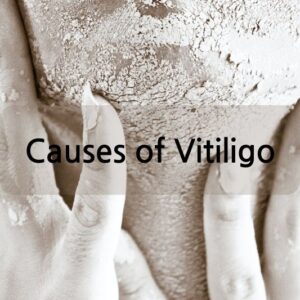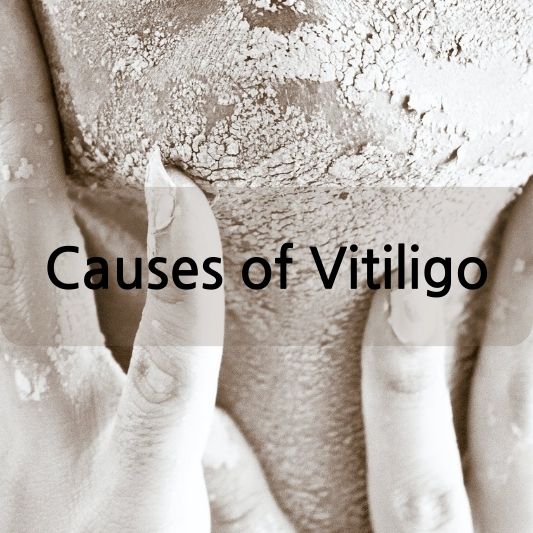Vitiligo is a complex skin condition that affects millions of individuals globally. This article aims to delve into the intricate factors contributing to the onset and development of vitiligo, exploring the multifaceted causes behind this pigmentary disorder.

Introduction to Vitiligo
Vitiligo is a skin disorder characterized by the loss of pigmentation, resulting in white patches across the skin. It impacts people of all ages, genders, and ethnicities, causing considerable distress due to its conspicuous nature.
Understanding the Causes of Vitiligo
Genetics and Hereditary Factors
Research indicates a strong genetic predisposition to vitiligo. Individuals with affected family members are more prone to developing the condition. Scientists have identified specific genes associated with vitiligo susceptibility, shedding light on its hereditary nature.
The Immune System and Vitiligo
An autoimmune hypothesis suggests that vitiligo stems from an immune system malfunction, wherein the body’s defense mechanism attacks its melanocytes, the cells responsible for skin pigmentation. This leads to the destruction of melanocytes, resulting in depigmented patches.
Neural and Biochemical Factors in Vitiligo
Apart from autoimmune factors, neural theories suggest that neural damage or neurochemical imbalances may contribute to vitiligo. Oxidative stress and biochemical imbalances also play a role, influencing melanocyte destruction and triggering depigmentation.
Genetic Predisposition and Vitiligo
Studies have pinpointed specific genes associated with vitiligo susceptibility. However, while genetic predisposition is a significant factor, environmental triggers and lifestyle choices also contribute to its onset.
The Immune System and Vitiligo
The immune system’s role in vitiligo cannot be overstated. An overactive immune response damages melanocytes, leading to depigmentation. Understanding these immune-related mechanisms is crucial for developing effective treatments.
Neural and Biochemical Factors in Vitiligo
Neural damage and biochemical imbalances can disrupt melanocyte function, contributing to the manifestation of vitiligo. Exploring these factors is essential for a comprehensive understanding of the condition.
Environmental Triggers and Lifestyle Factors
Several environmental triggers, such as sun exposure, chemical exposure, and psychological stress, can exacerbate vitiligo. Managing these triggers is essential for minimizing the condition’s impact.
Treatment Approaches for Vitiligo
Various treatment options, including phototherapy, topical treatments, and experimental procedures, aim to repigment affected areas and manage the progression of vitiligo. Understanding these approaches provides hope for individuals living with the condition.
Quality of Life and Emotional Impact
Living with vitiligo can significantly impact mental health and self-esteem. Support networks and coping mechanisms play a crucial role in improving the quality of life for those affected.
Prevention and Management Strategies
Early detection, lifestyle modifications, and holistic management approaches can help minimize the impact of vitiligo and improve outcomes for individuals affected by this condition.
Conclusion
Understanding the causes of vitiligo involves a multifaceted exploration of genetic, immune-related, neural, biochemical, and environmental factors. By comprehending these intricacies, researchers and medical professionals can advance treatments and support individuals living with vitiligo.
FAQs
Is vitiligo hereditary?
Vitiligo often has a genetic component, but not everyone with a family history will develop it.
Can stress trigger vitiligo?
Psychological stress can exacerbate vitiligo but might not directly cause it.
Are there effective treatments for vitiligo?
Several treatments aim to manage vitiligo, but responses vary among individuals.
Can vitiligo be prevented?
While prevention isn’t guaranteed, early intervention and lifestyle changes might minimize its impact.
How does vitiligo affect mental health?
Vitiligo can impact self-esteem and mental health due to its visible nature, necessitating emotional support and coping strategies.
Find out the price of nutritional supplements to help your skin health on iHerb!
